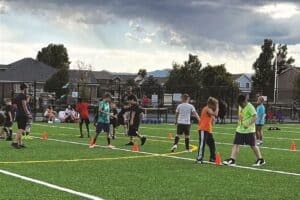Barking dogs and unkempt lawns have long been the source of strife between neighbors in residential communities. With the passing of Amendment 64, arguments over the sights and smells of marijuana growing next door and the consumption of the plant have joined the list of Falcon neighborhood complaints. Constantly changing and inconsistent rules about how and where marijuana can be grown in Colorado has added to the controversy.A few Falcon residents contacted The New Falcon Herald asking for clarification on whether residents in unincorporated El Paso County are permitted to grow marijuana in backyards for personal use, and what recourse neighbors have against a perceived nuisance. Pueblo County’s planning and zoning commission held a contentious public hearing about banning personal-use growth in residential properties. The commission postponed a decision to Nov. 12, after listening to about 20 speakers on the issue.Marijuana advocates say the issue is settled based on the wording of Amendment 64. ìLimiting the number of plants per person regardless of the number of people in the home is obviously unconstitutional,î said Rachel Gillette, attorney and executive director of Colorado NORML, the state chapter of the National Organization for the Reform of Marijuana Laws. Referring to the Colorado Constitution as amended by 64, Gillette said. ìI don’t think it was ever intended for government to reach into peoples’ homes and say where people couldn’t grow their six plants, and that’s where Pueblo and other local governments are over-reaching.îAmendment 64 gave counties and cities the ability to opt out of allowing retail stores, marijuana cultivation facilities and other establishments from that particular government’s jurisdiction. El Paso County quickly banned marijuana-related shops and businesses in unincorporated El Paso County, including Falcon, in January 2013.However, as defined by Colorado law, ìmarijuana cultivation facilitiesî does not include someone using the provision to grow plants for their personal use, according to the amendment. ìMarijuana cultivation facility means an entity licensed to cultivate, prepare and package marijuana and sell marijuana to retail marijuana stores, to marijuana product manufacturing facilities, and to other marijuana cultivation facilities but not to consumers,î according to section 2(h) of the amendment.The amendment also requires that people who grow marijuana for personal-use do so in an enclosed, locked space. Growing the plants must not be conducted openly and publicly and never made available for sale. ìThe governor’s task force on this issue recommended that there be a clarification of this definition,î Gillette said. ìThey recommend that it be a permanent space enclosed on all sides, including overhead.î Sheds, locked greenhouses and artificially lit interior rooms would meet this definition.Cannabis plants in an unenclosed garden box in a backyard would not meet that definition, and would not be legal if growing out in the open, Gillette said. ìThere is an argument to be made about open outdoor grows,î she said. ìBut we believe that it’s not open and public if it’s on private property, period.îThere are few or no official documents to guide residents who want to legally and safely grow cannabis at home. ìWhen the law is so unclear and changing, it’s difficult for Colorado NORML to provide guidance,î Gillette said. The state Legislature passed laws to incorporate many of the task force’s recommendations on retail and commercial operations, but not for the definition of enclosed, locked space.Insuring, financing and eventually selling a residential property that had cannabis plants growing on it is also problematic. Cherri Fischer, chair of the Pikes Peak Association of Realtors, said the issue is so new for real estate professionals that there is little case law and legal guidance about whether agents could be liable for participating in a sale of a property where marijuana has grown. ìOur position that we take as Realtors is to always disclose to buyers, no matter what it is,î Fischer said. ìWe recommend to sellers they disclose and explain, rather than having it come up with the neighbors after the sale.îInsuring a home where marijuana grows is also challenging. ìIt’s not part of our underwriting questions,î said Janet McMonigal of Farmers Insurance. ìHowever, if the client freely gave up that information we would have to decline because of federal law.î Any damage to marijuana plants, supplies or paraphernalia will not be covered by insurance. Special equipment such as lighting, fans and heat source could cause fires that damage other parts of the home, and any damage caused by that fire may not be covered. A case involving USAA in Hawaii resulted in the court siding with the insurance company that denied a homeowner’s claim involving 12 plants allegedly worth $45,000 that were destroyed.Until the state Legislature formally adopts the task force recommendations for personal use growing, Falcon residents who want to keep peace in the neighborhood and grow their six plants using natural sunlight should ensure they are using the best available and current guidelines: The plants should be screened from view, enclosed and locked on all sides and overhead to prevent access to the area.







